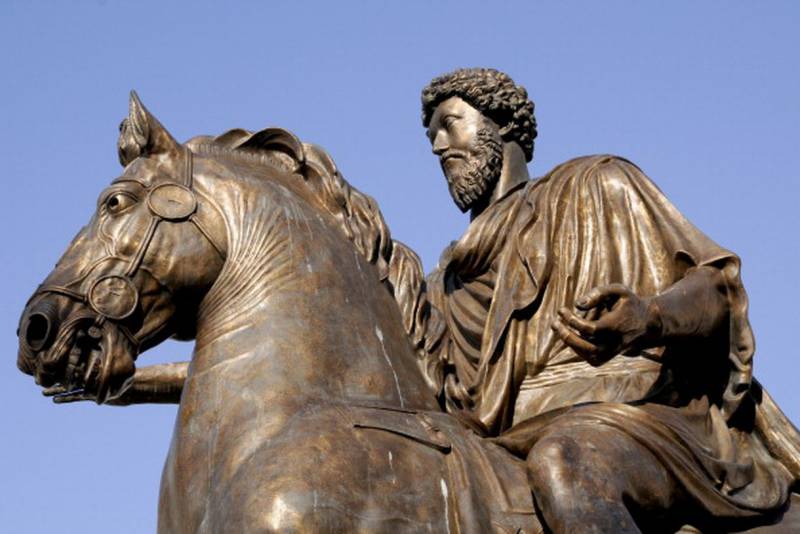Stoicism, explained.
Stoicism is having a bit of a moment.
Which is somewhat odd, since Stoicism is a school of thought that dates all the way back to Zeno of Citium in ancient Greece. It’s a philosophy that preached detachment from the passions and a belief in the supremacy of our rational mind. If I had to boil it down, I’d say the Stoics were mostly searching for ways to master themselves through the control of their emotions. And the goal wasn’t merely to live a good or virtuous life, it was also to be happy in a truly sustainable way.
It was a very practical way of seeing the world and as the philosophy spread from Greece to Rome in the first and second centuries, it became an extremely influential worldview for Roman elites and politicians, like Cato and Seneca and perhaps most famously for the emperor Marcus Aurelius.
But why is Stoicism making a comeback?
I reached out to Ryan Holiday for a recent episode of Vox Conversations to get some answers and talk about what the Stoics actually believed. Holiday is a prolific author (most recently of Courage is Calling) and the host of The Daily Stoic podcast. Among other things, we discuss the Stoic conception of happiness, what’s worth giving a shit about and what isn’t, and how Stoicism can address our modern anxieties.
Sean Illing
I know you think of Stoicism as a public philosophy aimed at ordinary people and everyday life, which I think is true, but one of the recurring criticisms is that it’s largely an elite obsession. What do you make of that?
Ryan Holiday
I think Stoicism is somewhat a victim of its own recent success. It’s popular with people in Silicon Valley. It’s popular with people who are professional athletes. It’s popular with CEOs. It’s popular in elite circles today, not because I think it only works for the elites, or only the elites have the ability to understand it, but because Stoicism is a philosophy that is designed for stress and leadership and dealing with distractions and temptations and that tends to lend itself well to a particular group.
The other way you could see it is that most of the Stoics throughout history were men, because only men were allowed to be involved in those things. But I would guess 40 to 50 percent of the readers of my books and the people I hear from on my platform are women, because now women are dealing with those same issues and are like, “Well, nobody prepared me for this. What is the framework or philosophy I need to navigate the boardroom or the locker room or entrepreneurship or whatever?”
As a philosophy, one of the things I love about Stoicism is the dichotomy you’ve talked about, which is the two most famous practitioners of Stoicism are Epictetus — who was born a slave in Greece and comes to be owned by one of the secretaries of Nero — and Marcus Aurelius, the emperor of Rome.
Epictetus was tortured and he spent 30 years of his life in slavery. But eventually he becomes a philosopher. He doesn’t write anything down, but his lectures survive to us. One of the attendees of his lectures is the Emperor Hadrian. And then as it happens, Hadrian’s successor Marcus Aurelius is given a copy of Epictetus’s lectures by his philosophy teacher. And there’s no philosopher that Marcus Aurelius, the emperor of Rome, quotes more than Epictetus.
To me, the proof of the philosophy and its universality is that back to back, its two most influential thinkers are someone of extreme privilege and someone of extreme powerlessness. I think it works for both in that the central tenet of the philosophy is: Focus on what you control, focus on the response to the things that are outside of your control. Do the best you can in the world within which you exist.
Obviously the Roman world was a more stratified, hierarchical, and less meritocratic world than we live in now. But I find that it helps me just as much as when I was a poor college student as it does now.
Sean Illing
There’s a plasticity to Stoicism that is hard for me to wrap my hands around. Sometimes it feels a little Zen, sometimes it feels self-helpy, sometimes it’s pitched as a “how to be manly” handbook for alt-right types, and sometimes it’s a modern life hack philosophy for Silicon Valley. Beyond what you just said, is there something about the nature of Stoicism that makes it so malleable?
Ryan Holiday
I think so. First off, there’s no singular book or a singular statement of principles or ideas. What survives to us, like the Zen tradition, is kind of a collection of fragments and personal attempts to apply the philosophy to one’s life.
So to go back to Epictetus and Marcus Aurelius — Epictetus is a teacher of Stoicism, but all that survives to us is a collection of notes from one of his students, right? His student Arrian. So we have only a set of fragments from Epictetus. Like, he was asked these following questions, and these were his answers. It’s by no means conclusive. That influences Marcus Aurelius. What survives to us from Marcus Aurelius? It’s just the journal of the most powerful man in the world, writing notes to himself.
And then the other most prolific and famous Stoic is Seneca. And all that survives to us from Seneca is Seneca’s handful of essays. And then Seneca’s letters to his friend Lucilius.
So part of why I think Stoicism works for us today is because of all that was lost, what’s left to us is a set of fragments and ideas that I think allow us to adapt and apply it to today’s life, in a way that if it was something as thick as the Bible or whatever, the specificity would make it harder to adapt it to our own purposes.
Sean Illing
What would you say the Stoics were most concerned with?
Ryan Holiday
How do you just wake up and deal with a world filled with difficult people? And how do you stay true to what you believe, to what you think, to your duties and obligations, when people can feel like obstructions or disincentives to what you should be doing?
And I just love that the Stoics were not just practical in terms of how do we get stuff done, but they’re like, how do you go through the world and not be bitter and angry?
Sean Illing
One way to do that is to continually ask yourself what’s worth giving a shit about and what isn’t. What’s the Stoic guidance here?
Ryan Holiday
So Epictetus actually says that this is the primary question of life: “Is this up to me?” The test isn’t should I give a shit about it. It’s more a statement. Only give a shit about things that you can influence or control.
And so for the Stoics, it’s a radical narrowing of your interests, your intentions, your moods, your reactions toward things that you have control over. This is also the root of the idea of the serenity prayer, right? To know what’s in your control, to focus on the things that are in your control, and then to have the wisdom to let those other things go.
Does this mean the Stoics are not concerned with social change or action? No, I don’t think so, and we can get into the specifics of that. But it’s a radical notion to say, “Hey, a lot of the things that upset people, that they spend inordinate amounts of time and energy trying to get, are not up to them.”
As an author, I think about this all the time. The book that I write is largely in my control. How it’s received by other people, the number of copies it sells, the critical reception — that is largely out of my control. And to make this distinction and to say, “I’m going to focus the vast majority of my time and energy and efforts toward the product itself and not hoping, yearning, praying, and setting myself up for disappointment by emoting about these other things” — that’s a hugely important resource-allocation choice.
Sean Illing
I’m glad you alluded to this criticism that Stoicism is too removed from the world of others. I guess the fear is that the emphasis on acceptance obscures this imperative that we all have to confront and remake the world, right? Epictetus says to not spend our feelings on things beyond our power. Okay, but what’s in our power, not as individuals, but as a community, as a collective? That’s less clear.
I can see the appeal of Stoicism in a moment in which people feel powerless. Or when inequalities are growing. And maybe if you’re looking for a political philosophy or a philosophy that will inspire collective action, maybe Stoicism isn’t where you should look. But I suspect you may disagree with that—
Ryan Holiday
Yeah, I do disagree with that. I see the temptation and I certainly see the history where that may have been the case. I’ll give you an example here. There’s an interesting passage in Meditations at the beginning where Marcus Aurelius says he’s thanking a man named Severus. He says, from Severus I learned to love my family, truth, and justice. It was through him that I encountered Thrasea, Helvidius, Cato, Dion, and Brutus. These are members of the Stoic opposition who conceived of a society of equal laws governed by equality of status and of speech, and of rulers who respect the liberty of their subjects above all else.
So I think politically the Stoics had a conception, not unlike the Founders, of a world that was better than the one they were in. The trouble has always been getting from theory to practice. And how do we get from theory to practice? By being involved, by putting oneself out there.
I think the Stoics don’t ever speak of the idea of collective action. But they were military leaders. They were politicians, some were in the republic, some were in the empire. They clearly understood that human beings had a power when they came together and did things together. They just don’t speak about it enough.
Sean Illing
There’s this Stoic idea that we shouldn’t look to material conditions to judge whether someone’s happy, which, of course, is an easy thing to say when you’re eating at a well-fed table. Obviously material conditions matter, but what does it mean to be truly happy for the Stoics? If it’s not primarily about power or wealth or whatever, what is it?
Ryan Holiday
I think the Stoics don’t do a great job saying, here’s what happiness is. They don’t do a great job defining their terms, but sometimes when you hear something, you’re like, that’s it.
One of the great expressions from Zeno, the founder of Stoicism, is what he calls “the smooth flow of life.” And to me, that’s a great way of describing happiness. Where it’s not that you have necessarily eliminated all external disturbances, but you are in a place where you’re adaptable and flexible. This is where I think acceptance comes in as an important component of happiness. The Stoics talk about the smooth flow of life that comes when one lives with virtue and in accordance with nature.
So I don’t know, when I think of moments that I’m happy, it’s usually when I’m doing my job well, or when I feel like I’m making a positive contribution to the world, or when I’m with people I love, or when I’m outside. It’s also when I’ve eliminated the inessential things from life, right? It’s when I’m not caring about what other people think, not worried about pointless obligations or trivia or gossip or anger.
I realize I’m not giving you the perfect one-sentence definition. But I think there is something about a natural life, a life focused on what is essential. A life built around duty and ethics. And then ultimately adapting and finding a way to get close to that.
Sean Illing
Do the Stoics offer a simple definition of success?
Ryan Holiday
I think it would be playing the role that life has handed to you well. Epictetus says that we’re all actors in a play. We’re not the director. So can you play that role well? I think Epictetus does impossibly well as a slave-turned-freeman. Marcus Aurelius does incredibly well as emperor. Wherever you are, whoever you are, whatever circumstances have led up to where you are in life, I think success is something like: Did you do that as well as it could be done?
Sean Illing
Do you ever feel like the Stoics almost ask too much of us? Most of us, most of the time, aren’t able to deal with the world with such equanimity—
Ryan Holiday
I would say that every philosophical school or religious tradition demands more of us than we are capable of. Christianity demands that we turn the other cheek. Zen Buddhism demands that we find meaning in our suffering, that we follow the eightfold path. Like it’s all impossible, right? And this is why there’s like a handful of figures who have even conceivably claimed to have reached some form of enlightenment.
Epictetus says that we should not abandon our principles for despair of reaching them. Basically, that we don’t give up just because it’s impossible. But, in fact, we accept that it’s impossible, and we just try to approach it. We just try to get close.
By Sean Illing




